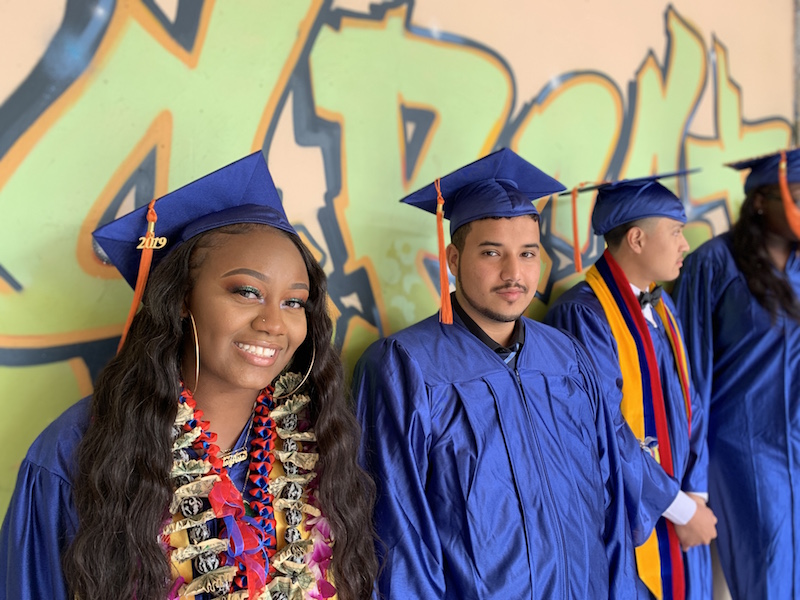
In 2019, at Bay Area Technology School (BayTech) in East Oakland, 100 percent of seniors graduated and all completed their A-G requirements, making them eligible to apply to UC and CSU schools. Administrators have a three-part plan that’s supporting students to get there, BayTech principal Seth Feldman said: it involves a lot of love, coaching, and a velvet hammer.
“Ms. (Loletha) Powell is loving and she’s caring and the kids really respond to her,” Feldman said. “Mr. (Ryan) Hughes is more of a coach, and he has that coaching mentality. I am, even though I’m the principal, the velvet hammer. If you’re not doing your work, you come and meet with the principal and we’re going to figure out that plan. We as a school are not going to let you fail.”
Powell is BayTech’s dean of students; Hughes is the school’s counselor. Like Feldman, their roles extend beyond that and into the classroom: Hughes is also a science teacher and Powell has taught math at BayTech. Feldman teaches the school’s SAT prep class.
It’s all part of an all-hands-on-deck approach to teaching and learning at BayTech, rooted in the belief that staff collaboration in the name of student success is very important, structural roadblocks need to be removed, and “what’s best for kids” comes first.
“What we know at BayTech is that all the magic in a school happens in the classroom,” said Feldman, who has previously worked at district, charter and private schools. “You need to do everything you can to make sure that what happens in that classroom is the best for all of those kids, and you need to break down all of those barriers to make sure that those kids can be served. I’m really happy we can do that at BayTech.”
Students are encouraged to take the more challenging route, and are eager to do so. Many take community college classes, and Feldman said a third of the junior class has passed college-level math classes at the Peralta Colleges. “When we encourage them and help them build their schedules to achieve that,” Feldman said, ‘that gives them the power to dream.”
Hughes said he’s proud to work at BayTech because of that collaborative approach and how the structure helps motivate students. “The kids want to do better and I’m trying to coach them on how to reach their goals,” he said.
It’s not unusual for a student to improve by multiple grade levels over the course of a year, Hughes said. “I’m very proud to work at Bay Tech when I see the numbers and see that students are taking responsibility for their own education,” Hughes said. “They do know their numbers and they are going up three and four grade levels because they want it.”
Students who are multiple grade levels behind arrive from other schools, Powell said, and catching them up requires integrating them into the BayTech culture, which is often more structured than their previous school and requires an adjustment.
“When you get students from different schools, they don’t have the same culture as we have that’s built in, and it takes a lot of work to connect with those students,” Powell said. “This school is more strict, it’s more challenging, they’re not used to this.”
Powell said what helps her connect with students is that with a 6–12 school, by the time a student reaches the upper grades of high school there has been time to build relationships. Those students have had time to build up trust. They have 1–1 relationships with staff. Feldman said the current 11th grade class is especially strong, with many of the students starting at the school in 6th grade.
“We have data that shows that the longer a student stays at BayTech, the higher their math and english scores go,” Feldman said. “The longer they’re in our program, they are more literate and have better numeracy.”
As an Oakland native and McClymonds High School graduate, Powell understands where students are coming from and can build connections. “I try to get the students to understand that in spite of their situation and everything that’s going on around them, that’s not an excuse to not try to do well and succeed, because they can,” she said. “I try to get students to understand that I know you want out of your situation, and the best way you can is through education.”
That support includes following up with students once they reach college, like a Bay Tech grad at UCLA, Powell mentions she recently spoke with. But it also means supporting all students with varying needs, including a standout student whose parent none of the staff was ever able to reach and didn’t show up to graduation. “We always let them know we’re with them,” Powell said.
Expanding students’ horizons and increasing what they believe is possible is tied to that.
“One of our jobs as educators is to teach them what’s outside of their 2-mile radius,” Feldman said. “So we spend a lot of time asking what their dreams are, and trying to figure out how to achieve their dreams. Oftentimes they can’t see beyond what’s in front of them. Our job as educators, our job as a school employee, is to help students see their own potential.”
